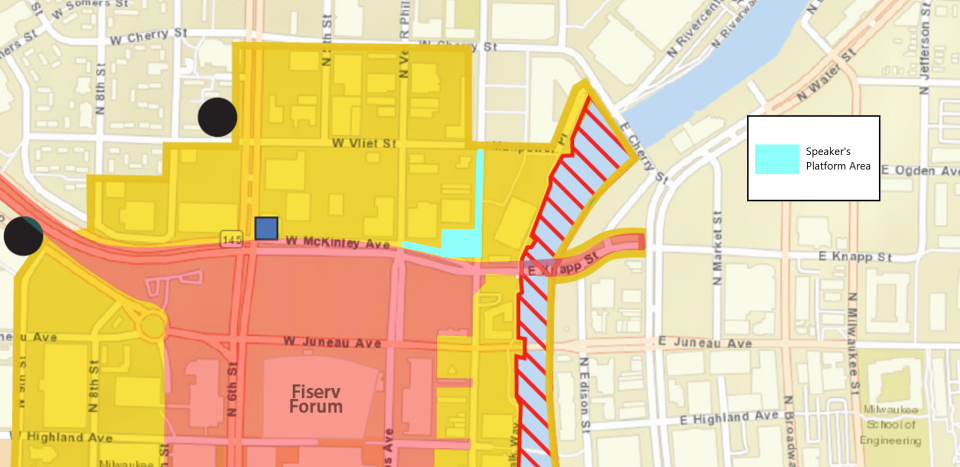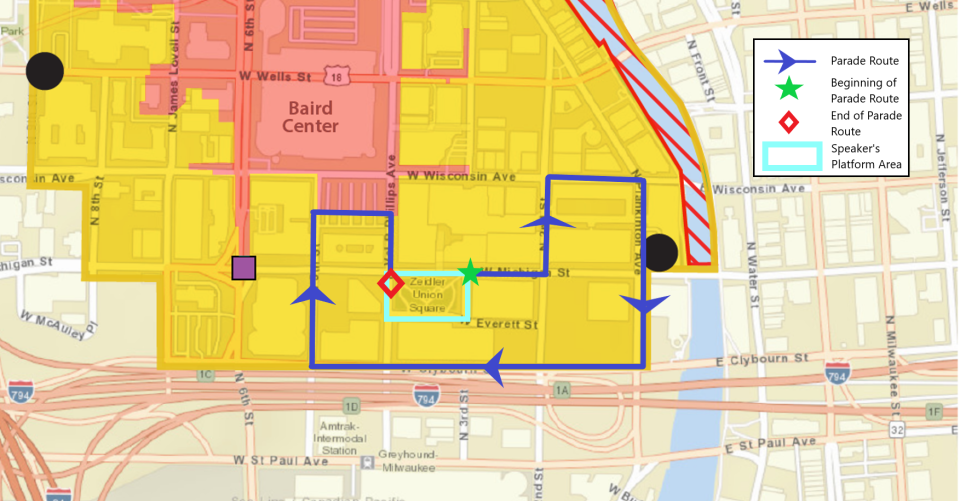Protest rights may look a little different during the 2024 RNC. What to know
Scores of demonstrators are expected to protest outside the Republican National Convention next week.
Marquette University Law School professor Scott Idleman and the American Civil Liberties Union offered insight to the Journal Sentinel about the freedom of speech and protest rights you should know about during the convention.
What are the RNC demonstration zones and where are they?
A demonstration zone is a designated area for political demonstration during major events.
There are two designated demonstration areas for the RNC, one on the north side near Fiserv Forum and another on the south side near the Baird Center. Each area has a speaker's platform.
On the north side, the platform will be located at Haymarket Square at West McKinley Avenue and North King Drive, and on the south side, the platform will be at Zeidler Union Square.


The hard zone, where credentials will be required to enter, surrounds the primary RNC venues at Fiserv Forum, UW-Milwaukee Panther Arena and the Baird Center. That area is surrounded by a security footprint, where members of the public can enter but where various objects are not allowed.
Do you need a permit to protest at the RNC?
Marches, parades and large rallies, like the ones planned for the RNC, require permits from the City of Milwaukee.
According to the ACLU, the usual permit distribution process includes submitting an application well in advance of the planned event.
However, in March, Ald. Robert Bauman assured people that "all other First Amendment rights that otherwise exist still exist."
"So, if someone wants to stand on a corner and talk to members of the public, if someone wants to do what they normally do around City Hall — stand outside, stand across the street and express their point of view — this ordinance does not preclude that in any way, shape or form, even inside the security zone," he said.
What happens if protesters leave the demonstration zones?
In most cases, individuals have the right to demonstrate on public property, like plazas in front of government buildings, as long as they do not block access to the street or building entrances.
According to the ACLU's "Know Your Rights Guide," demonstrators' rights are strongest in “traditional public forums,” such as streets, sidewalks, plazas and parks.
But the RNC's strict security rules impose more restriction.
According to Idleman, the broad language of the City of Milwaukee's protest ordinance confines large rallies and parades to the designated demonstration areas.
When asked about how police would respond to protesters leaving the demonstration zones, the Milwaukee Police Department said only that it "respects the rights of all individuals who wish to peacefully express their First Amendment rights."
More: How Milwaukee police will handle protests at the RNC and what some say is missing from their plan
If a police officer asks for the name of a protester, but is not placing them under arrest, does the protester have to respond?
According to an ACLU spokesperson, individuals are not required to answer any questions of law enforcement under the Fifth Amendment. It is not a crime in Wisconsin to refuse to identify yourself to a police officer, unless you are being detained or arrested.
However, according to Idleman, the RNC's strict security perimeters might leave a bit of gray area. Normally, law enforcement cannot demand identification unless there is "reasonable suspicion of unlawful activity."
If a protester makes their way toward or near the hard security perimeter, they could be asked to display credentials or identification that show that they are allowed to to enter the area.
ACLU officials added that failing to offer proof of identification could lead the police to be more suspicious. If the police believe they have enough evidence of a crime, they could initiate an arrest. Individuals should never lie about their name, because that is obstruction.
The ACLU encourages people stopped by the police to respectfully ask, "Are you detaining me, or am I free to go?"
If a person is being arrested, they have the right to state that they do not want to answer questions without an attorney present.
Are there rules that govern the behavior of opposing groups at a protest?
According to the ACLU, police are permitted to keep antagonistic groups separated, but, according to state law, the groups should be allowed within sight and sound of one another.
Protesters of opposing groups are allowed to speak to and shout at one another during rallies and demonstrations. A protester cannot be arrested for exhibiting those behaviors.
At a protest, the police are responsible for protecting each group and their expression.
What types of speech are not protected? Is hate speech protected?
Though almost all speech is protected at a protest, there is an exception for so-called "fighting words" that have the potential to cause harm to an individual or group.
This type of speech is an incendiary, obscene or defamatory statement that aims to incite violent action. This speech is directed at a specific individual or group that creates an imminent threat or violence.
Protesters should avoid using this language, as it could lead to arrest or removal from the protest premises.
According to Idleman, hate speech and usage of slurs on the basis of race, religion, skin color, sexual identity, gender identity, ethnicity, disability, or national origin are protected speech and are not necessarily considered fighting words.
What rules should people be aware of when capturing video or photos at a protest?
Generally, the courts state that if a person is in a public space, they do not have any particular expectation of privacy. Therefore, individuals can be photographed or surveilled while walking down a public street, protesting, or partaking in any activities within a public area.
In an April interview with the Journal Sentinel, ACLU attorney Timothy Muth said, "If the police are arresting people or using force, protesters have the First Amendment right to to record and photograph. We generally encourage people not to photograph identifiable pictures of protesters who have not agreed to be photographed."
Do police officers have the right to view photos and videos captured at an event?
Protesters can only guarantee that their photos and videos are not accessible to law enforcement if they establish a lock or password on their phone before attending a protest.
"Under the Fourth Amendment, it is prohibited for the police to search your phone without a warrant, but that doesn't mean they won't look through an unlocked phone," Muth told the Journal Sentinel in April.
The ACLU said anything that protesters post publicly to social media can be evaluated by law enforcement following a protest and used as evidence.
More: What to know about Milwaukee police rules for handling mass demonstrations outside RNC
Are there any banned items that attendees cannot bring into the security footprint?
Yes, there is a long list of banned items for the security footprint.
These include air rifles, paintball guns, combat gloves, billy clubs, swords, axes, slingshots, metal water bottles, aerosol cans, ladders, BB guns, pellet guns, nunchucks, shovels or other things that could be used to hurt people or damage property.
Review the full list of restrictions here.
Are there any restrictions when it comes to carrying guns?
In the "hard perimeter," U.S. Secret Service officials has said that weapons are not allowed.
However, most guns will be allowed within the RNC security footprint. According to the City Attorney's Office, the weapons that are banned under state law include machine guns, short-barreled shotguns, short-barreled rifles and silencers.
According to Idleman, for the guns that are allowed in the security footprint, people cannot use the weapon expressively or in a threatening way such as unholstering a weapon and showing it to someone or pointing it in the direction of a passerby.
In Wisconsin, individuals need a permit to conceal and carry a gun. They do not need a permit to open carry.
What other safety precautions should demonstrators keep in mind?
Attorneys recommend that people know their rights and establish safety precautions ahead of engaging in protest activities.
"I would urge people to be mindful of the police, who are probably under a lot of stress," Idleman said. "They don't know people's intentions. They don't know who's carrying weapons. They don't know what your purpose is... I think both sides have to be a little bit flexible and not necessarily view each other always and ever as enemies."
If protesters think there is a possibility of getting arrested, the ACLU advises them to memorize a phone number for a person who can pick them up from the police station or contact a lawyer on their behalf.
If protesters believe their rights have been violated, the ACLU recommends they complete the following steps:
Write down everything they can remember, including officers' badge and patrol car numbers and the agency they work for
Get contact information for witnesses
Take photographs of all injuries
File a written complaint with the agency's internal affairs division or civilian compliant board
Tamia Fowlkes is a Public Investigator reporter for the Milwaukee Journal Sentinel. Contact her at [email protected].
Alison Dirr of the Journal Sentinel contributed to this story.
This article originally appeared on Milwaukee Journal Sentinel: Rules and reminders for the 2024 RNC protest zones in Milwaukee
